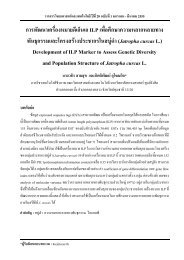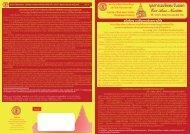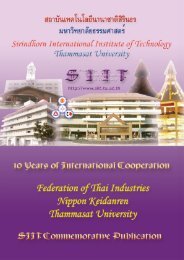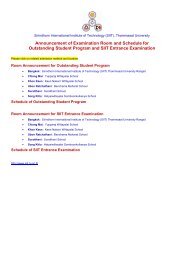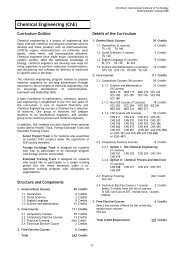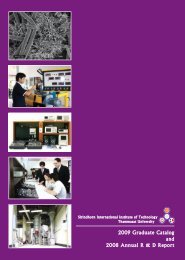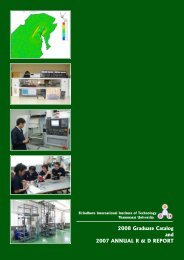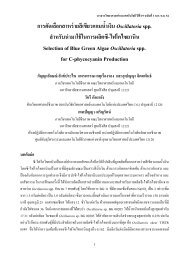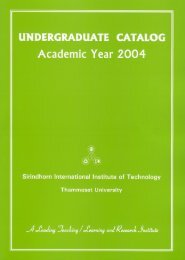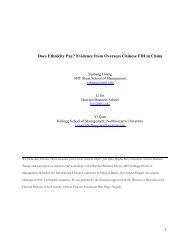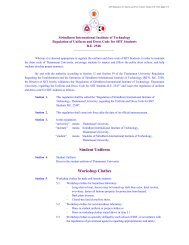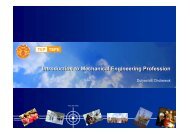2007 Graduate Catalog and 2006 Annual R & D Report - Sirindhorn ...
2007 Graduate Catalog and 2006 Annual R & D Report - Sirindhorn ...
2007 Graduate Catalog and 2006 Annual R & D Report - Sirindhorn ...
Create successful ePaper yourself
Turn your PDF publications into a flip-book with our unique Google optimized e-Paper software.
<strong>2007</strong> <strong>Graduate</strong> <strong>Catalog</strong> <strong>and</strong> <strong>2006</strong> <strong>Annual</strong> R & D <strong>Report</strong><br />
<strong>Sirindhorn</strong> International Institute of Technology (SIIT)<br />
Dr. Lalita Tantimuratha<br />
Assistant Professor<br />
B.Eng. in Chemical Engineering, Kasetsart University, Bangkok, Thail<strong>and</strong><br />
M.Sc. in Process Integration, University of Manchester Institute of Science <strong>and</strong> Technology (UMIST), UK<br />
Ph.D. in Process Integration, UMIST, UK<br />
Area of Specialization: Heat Recovery Network.<br />
Research Interest:<br />
With consideration on energy savings <strong>and</strong> efficient<br />
use of energy, research interests are in the area of<br />
heat recovery network design. The concept of<br />
pinch technology is applied with mathematical<br />
programming to obtain heat recovery systems. Apart<br />
from more efficient use of energy, the systems should<br />
also be economically designed. Operability <strong>and</strong><br />
flexibility of heat exchanger networks (HEN) are also<br />
considered. Methodologies <strong>and</strong> optimisation models<br />
for HEN design are required for simpler, more<br />
practical, <strong>and</strong> flexible networks. Optimisation <strong>and</strong><br />
design of heat exchanger networks in synthesis <strong>and</strong><br />
retrofit problems are both of interest. Interesting<br />
researches are also the applications of developed<br />
methodologies on industrial problems in Thail<strong>and</strong>.<br />
Dr. Navee Chiadamrong<br />
Associate Professor<br />
B.Eng. in Industrial Engineering, Chulalongkorn University, Thail<strong>and</strong><br />
M.Sc. in Engineering Business Management, University of Warwick, UK<br />
Ph.D. in Manufacturing Engineering <strong>and</strong> Operations Management, University of Nottingham, UK<br />
Areas of Specialization: Cellular manufacturing systems (CMS), Advanced manufacturing systems, Systems<br />
simulation, Production planning <strong>and</strong> control, Sypply chain management.<br />
Research Interests:<br />
Simulation Modelling <strong>and</strong> Analysis<br />
Simulation is one of the most powerful analysis tools<br />
responsible for the design <strong>and</strong> operation of complex<br />
systems. Simulation involves the modelling of a<br />
process or system in such a way that the model<br />
mimics the response of the actual system to events<br />
that take place over time. The model can be used to<br />
predict future behaviour <strong>and</strong> the effects produced by<br />
changes in the systems or in its method of operation.<br />
Cellular Manufacturing Systems (CMS)<br />
CMS is another form of manufacturing system which<br />
applies the concept of group technology to provide<br />
some of the operational advantages of a flow shop<br />
while maintaining some of the strategic advantages of<br />
the job shop. Many research areas are involved in the<br />
concept including different types of cell formation <strong>and</strong><br />
production planning for controlling the operation<br />
within <strong>and</strong> among the cells (inter-cell workload<br />
transfer).<br />
Production Planning <strong>and</strong> Control (PPC)<br />
Production planning uses the information from<br />
product <strong>and</strong> sales planning to plan the aggregate<br />
rates of production <strong>and</strong> the inventory levels. The<br />
objective of production planning is to provide<br />
sufficient finished goods in a period to meet the sales<br />
plan objectives while staying within financial <strong>and</strong><br />
production capacity constraints. It is one of the richest<br />
areas that still require further research.<br />
Economic <strong>and</strong> Strategic Justification Methods<br />
The main objective of justification processes is to<br />
justify an investment to see whether or not it is worth<br />
investing. However, in justifying new manufacturing<br />
technologies, traditional justification methods, with<br />
their overemphasis on short-term savings, cause<br />
these projects to be rejected while others fail to come<br />
up to expectation. Many forms of the integration of<br />
economic analysis which provides results in monetary<br />
terms with strategic analysis showing results from<br />
evaluator rating of his or her subjective feeling are an<br />
interesting area for further research.<br />
Dr. Pisal Yenradee<br />
Associate Professor<br />
B.Eng. (1 st Class Honors) in Production Engineering, King Mongkut's Institute of Technology North Bangkok<br />
M.Eng. & D.Eng. in Industrial Engineering <strong>and</strong> Management, Asian Institute of Technology (AIT), Thail<strong>and</strong><br />
Areas of Specialization: Production <strong>and</strong> Inventory Control (P&IC) systems, JIT, MRP, <strong>and</strong> TOC; P&IC systems<br />
for Thai industries; Applied Operations Research; Supply Chain Management.<br />
Research Interests:<br />
Small- to medium-sized industries (SMIs) in Thail<strong>and</strong><br />
face considerable production <strong>and</strong> inventory control<br />
(P&IC) problems. These problems greatly deteriorate<br />
the manufacturing competitiveness of SMIs. In order<br />
34




